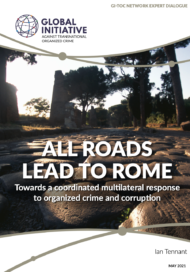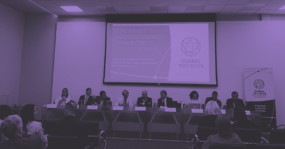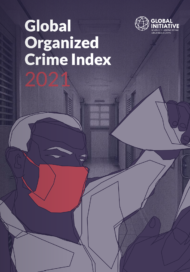Posted on 23 Dec 2021
A number of December 2021 summits and conferences have produced glimmers of hope for the global struggle against transnational organized crime and corruption, seen in announcements and strategies coming out of the US. However, civil society, which is key to the response, faces persistent hostility.
The interlinked nature of organized crime and corruption is being recognized increasingly, including during this year’s Italian presidency of the G20. Such recognition is key to tackling both issues effectively. The Global Initiative Against Transnational Organized Crime (GI-TOC) regards the role of civil society as crucial in developing an effective response to organized crime and corruption. However, it is a stance and approach that are not shared by all governments, and evidence of hostility to civil society working on organized crime and corruption is all too evident in some settings. At the extreme end, assassinations at the hands of organized crime continue unabated, while in certain multilateral settings the doors are closed to NGOs. In this context, 2021 has come to a close with some room for optimism, but tainted by ongoing exclusion of NGOs in key forums.
US democracy summit prioritizes fight against transnational corruption and organized crime
On 9–10 December, the US government held its first Summit for Democracy. President Joe Biden opened the summit with a call for renewed democratic values amid sustained challenges and increased dissatisfaction by citizens of democracies’ ability to deliver on the needs of the people. The event comes at a time when the administration seeks to re-establish an international role for the country in relation to the growing power of China in particular, and in the wake of fallout from the last administration. It was also designed to respond to real and sustained pressure by many governments on democratic norms, such as freedom of the press and digital repression. The summit’s timing also comes from a domestic imperative. Trust in democracy is at an all-time low, as opportunists across media, politics and the legal field continue to capitalize on claims of election fraud. In this context Republican lawmakers in 14 states have enacted 23 new laws which include measures expected to restrict electoral participation, undermine confidence or create confusion.
While some questioned the exclusive nature of the summit, which was by invite only to specific governments, the Biden administration used the debut summit to announce a raft of new domestic anti-corruption initiatives. For instance, the Treasury announced it would seek new rules to combat money laundering in the real estate market, while Congress has included the Transnational Repression Accountability and Prevention (TRAP) provision in the defense bill. Most notably, the US preceded the summit by releasing the government’s first US Strategy on Countering Corruption in early December to establish a whole-of-government response to an issue this administration has elevated to a national security threat. And through executive order, Biden established the Council on Transnational Organized Crime, consisting of key cabinet members, a second initiative aimed at improving government response to the issues.
One key theme of the summit was fighting transnational corruption, as well as dealing with the menace of authoritarianism and protecting human rights. During the summit, USAID Administrator Samantha Power launched the 2022 Combating Transnational Corruption Grand Challenge, to which the GI-TOC has pledged to contribute. During the high-level event, the GI-TOC’s deputy director, Tuesday Reitano, highlighted the challenges posed by corrupted state-embedded actors who are able to stonewall international cooperation and legislation, warp their own domestic institutions and undermine the rule of law. Over the next year, the GI-TOC committed to engaging its Network of Experts (consisting of 550-plus members) around this agenda, and to scaling up the work of the Resilience Fund, a civil society grants mechanism that supports actors working in communities most affected by criminal governance and systemic degradation of the rule of law.
Open Government Partnership Summit
At the same time, on the other side of the world, The Open Government Partnership (OGP) Summit – hosted by South Korea – was also discussing the global anti-corruption agenda. Panelists from around the world discussed the pervasive and immense challenges to democracy and good governance, and the cycle of low trust that poor governance engenders. The key takeaway from the plenary, and a theme across the extensive discussions during the summit, was that solutions lie in a pluralistic response that works with many different actors across multiple sectors and, importantly, across borders and boundaries. The resounding message was that civil society – in all its forms – is key to driving engagement, resilience and, ultimately, trust.
UN corruption conference: hostility to civil society among some member states
Despite this recognition of the important role of civil society voiced in the democracy and OGP summits, the 9th Conference of States Parties (COSP) to the UN Convention Against Corruption, held in Egypt, evidenced the growing barriers civil society faces to engaging with states on corruption and organized crime issues. The government of Turkey objected to the participation of eight NGOs. Without presenting evidence, Turkey accused these organizations of links to terrorism, and despite strong opposition to Turkey’s position on the part of the EU, US and other governments, and by the major anti-corruption NGOs, these organizations were not able to attend. A final decision on their participation will not be decided upon until the next COSP, in two years’ time to be hosted in the US. What’s more, the majority of the conference’s resolutions were agreed to by diplomats in advance in Vienna, meaning that civil society participants who did attend were not able to engage on or influence most of the policy outcomes of the conference. At the same time, the COSP continues to be held back by the convention that NGOs should not mention ‘country situations’ in case it offends or embarrasses the government concerned, in contrast to other UN settings such as the Human Rights Council.
Civil society looks ahead to upcoming corruption conferences as an opportunity to put into practice the values set out in recent US strategies and summits, as described above, to ensure that it can collectively, and hopefully without exclusion, make a meaningful contribution to the issues.
The GI-TOC was a registered observer to the conference and contributed with a high-level statement, a side event (the event recording will be uploaded onto this link) and a joint written submission with Transparency International. We emphasized the need to address the links between organized crime and corruption, and the key role that civil society, in all its diversity, plays in any effective strategy to counter these phenomena.



